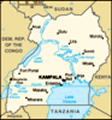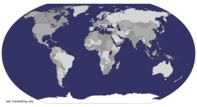Advertisement
Week 6 marks the half way point of our adventure in Uganda. We spent our week working in the Mbarara Referral Hospital on various wards including maternity, pediatrics, surgical emergency, and internal medicine. We enjoy working out at local gyms, afternoon trips to the market, and nightly family dinners. Raucous laughter can be heard frequently from our house making our residence the loudest on the block.
Four of us were invited to visit Nana Secondary Boarding School with our friend Shaay, a local TV host, on Tuesday. The school was very eager to host muzungus and we were, unfortunately, made the centre of attention. The students performed cultural dances, fold songs, comedy and the recited bible verses.
Please read on for perspectives from Tye, Rene, Kailee and Taylor about week 6 in Mbarara.
Tye on Canada Day,
We may be 12, 930km from home but the physical distance didn’t deter our spirits from celebrating Canada’s 150
th birthday. We kicked off the day in traditional style enjoying a banana pancake breakfast. Our second stop included a visit to Lake View Hotel where we were hoping to use their pool and shower facilities (a running water shower, especially if
the water is warm, has become one of our favourite Ugandan luxuries). To our disappointment all hotel facilities were shut down for the day being that the hotel owner’s twin boys were getting married. Together; on the same day.
It is a cultural tradition in Ugandan for twins, specifically males, to get married together exchanging vows with their respective brides on the same date. We enjoyed watching the ceremony, which closely mimicked a white western wedding.
Seeing that we ran to the hotel from our residence we were hot, sweaty, dirty, dusty and grimy. Thankfully, one of our former professors was visiting from Canada and took pity on us, allowing us to take turns using her hotel room shower. Walking on Dr. Fowler-Kerry’s lush hotel carpet was the first time we removed our shoes in an interior or exterior environment since our arrival six weeks ago. Boy oh boy did that red shag carpet feel good between our toes!
Once clean and sporting mascara for the first time in six weeks we returned to our residence where our neighbours, Canadian veterinarian students, invited us over for a good ol’ July 1
st BBQ; decked out in red and
white. We enjoyed laughs and story telling with our newfound Canadian comrades and also had the pleasure of meeting multiple Ugandans. The vets hired a few locals to barbeque a scrumptious meal including goat roasted on a stick, whole chicken, salsa, chapatti, cabbage along with cold bottled beer and soda. Our contribution to the meal included a scrumptious cabbage salad and monstrous fruit plate.
We were proud Canadians when we landed in Ugandan and this experience has only enhanced the pride and sense of gratitude we feel for our country. We are free, we are educated, we are kind and we are Canadian.
Hello from Ren,
Our time in Mbarara has been flying by so fast; we are already on week 2 of being back in the city. The hospital time has been met with challenges—again, the language barrier. However, once you make a friend with a staff nurse, you have your in: someone who will be by your side, ready to help you. We quickly learned that this time of year also brings many Mzungus to the Mbarara Regional Referral Hospital; instead of the 9 of us swarming a 30 bed labour and delivery unit (which
should actually be a 50 bed unit, with half the mom laying on mats on the floor), there was 14 Mzungus on this little unit. We quickly arranged ourselves in a way as to not overwhelm the patients and the nurses.
I opted to work a night shift, and this time I was joined by nurse Kailee and first year pharmacy student Alexis (rather known as Sanchez). The night shift was slow at first, but picked up from 12 am until 4 am, when we decided to call the night quits. We started counting the amount of babies being born, and quickly lost track. We think there was about 10 or 12 deliveries that happened that night. The three of us were heartbroken by the mothers and caregivers that lay on the floor throughout the unit. There is not enough time or space to accommodate the number of mothers that come through the doors. Women from scissors (aka c-section) can be found laying on the floor on a simple foam bed minutes after an exhausting surgical procedure. As we walked through the aisle formed from foam beds on the floor, with only enough room to walk in a straight
line, we were simply astonished by the amount of woman that took up any free space along the cement floor. The women sacrifice their own comfort and warmth so that their daughters, sisters, and friends can be cared for and comforted in this moment of bringing life into the world. This overwhelming sight made us thankful for the space and care we receive in Canada.
This past week we had the opportunity to visit and tag along with the local hospice team in Mbarara. This NGO Hospice seeks to provide care to referred palliative patients.Sitting in on the weekly case conference and joining the mobile palliative home visits was enlightening; we got to see the culture and complexity involved in palliative care here in Africa. It was refreshing to see how this group of nurses sat at the table and advocated for the patients in ways we wouldn’t even consider in Canada. An example of this is how the daughter-in-law of a palliative elderly male could not be considered to provide basic care for the man because of the cultural taboo around it. These nurses knew this, and discussed ways to work around it. What would seem like rather
basic care was made complicated, as they needed to work around many other cultural beliefs and traditions. I found this interesting with my First Nations background, wondering if this same consideration would be taken in Canada, or if we are far too Westernized to have these same considerations.
Kailee here,
Heading down to Central Market is an adventure we embark on in our afternoons to find some entertainment and to fill our time. Central Market is an outlet for locals to sell their produce, clothing, and other merchandise, all conveniently located along one street. Our fresh produce shopping has become a sport for us, one which we take seriously. With time and experience, we have acquired the skills, knowledge, and tenacity to come out victorious. Being a herd of Mzungus, we spark excitement amongst the venders the moment we enter the market. The venders holler and call at us, hoping to lure us to their stands to win over a selling price that is usually double, even triple the local price due to our mzungu appearance. Little do they know, we have learned some basic words, picked up on the true prices, and have mastered our poker faces
for bargaining. The odd time, we will get stubborn individuals who refuse to budge on their overpriced items, where others can be more light-hearted and willing to negotiate to a value that is fair. Fortunately for us, we have met some genuine, kind people who not only give us reasonable prices, but also take an interest in who we are, where we come from, and what we are doing. When all items of our shopping list have been checked off, we always leave with our bags full of delicious food, smiles extending across our faces, and our wallets a little lighter-- all knowing too well that on our return trips, we will have to compete again to get the best price.
Taylor’s bit…
I am not the best a typical blogging so I thought I would add a short story of mine to spice up the flow of our group blog. I wrote this after our first hospice mobile outreach day.
Two Dying Women There are two women in the same city from very different walks of life. The one is wealthy. She lays on a bed that is neatly made with fresh linens that sits
in a metal frame two feet off the ground. Her room is filled with the aroma of musty perfume and antiseptic cleaner. The clothes that cover her body are clean as is the dressing on her face. Her many daughters and granddaughters surround her bed offering support and sympathy. She resides in a sizeable gated home, with a spacious courtyard and the sun beams onto her through her large windows. Her daughter hands 20,000 shillings to the nurse for her services as she enters the room, the daughter does this because this woman’s floor is made of
marble.
The other woman is poor. She is asleep on a deteriorating mattress, half of its original size on the ground. The smell of urine is robust and pungent in the air. She is naked beside the thin blanket and countless flies that cover her wasting body. Her only company is a 13-year-old caregiver as there is no family in sight. She lives in a single room house with walls made of mud, no window, and a single solid metal door. The space is void of light besides the nearly burnt out flashlight she keeps by her head. As the nurse enters the room, the woman extends her hand in gratitude and gives nothing else in exchange for the care because this woman’s floor is made of
dirt.
Although their lives may seem vastly different, these two women share a lot of similarities. Both are cancer patients receiving palliative care delivered in there homes by the same nurses employed by an NGO. They feel the same pain, take the same medications, pray the same prayers, and both hold the same terminal prognosis. And regardless of what materials make up their floors, they both deserve and have been allotted the chance to die a dignified death.
Advertisement
Tot: 0.095s; Tpl: 0.015s; cc: 8; qc: 31; dbt: 0.0281s; 1; m:domysql w:travelblog (10.17.0.13); sld: 1;
; mem: 1.2mb








